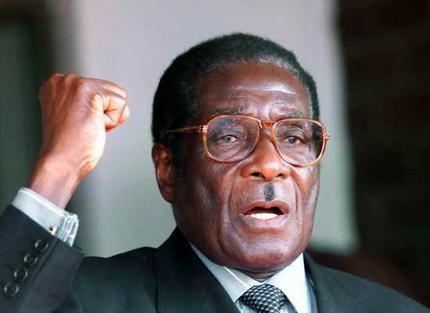 The charge sheet against Zimbabwe’s Robert Mugabe is long and packed with crimes of both commission and omission. The World Food Program expects half the Zimbabwean population will soon need food aid. Official inflation was 231 million percent in July – the last time statistics were released. Unemployment is over 85 percent; poverty over 90 percent; and foreign reserves almost depleted. Since Mugabe took power, thousands have died at the hands of his goons. Operation Murambatsvina, in 2005, alone cost some 700,000 people their homes, livelihoods or both.
The charge sheet against Zimbabwe’s Robert Mugabe is long and packed with crimes of both commission and omission. The World Food Program expects half the Zimbabwean population will soon need food aid. Official inflation was 231 million percent in July – the last time statistics were released. Unemployment is over 85 percent; poverty over 90 percent; and foreign reserves almost depleted. Since Mugabe took power, thousands have died at the hands of his goons. Operation Murambatsvina, in 2005, alone cost some 700,000 people their homes, livelihoods or both.
Now an outbreak of cholera has claimed around 600 lives and, according to Medicins Sans Frontieres, threatens another 1.4 million people. As there is no likelihood of an international intervention to topple to octogenarian rebel-turned-President, Britain should us its seat on the UN Security Council to table a resolution authorising the International Criminal Court (ICC) to investigate the chain of command behind the crimes committed by Mugabe’s regime against the Zimbabwean people.
It’s true that Zimbabwe, like the US, has not signed the Rome statute which set up the ICC. But the UN Security Council can refer a case to the Court, as they did with the government-backed militias operating in Darfur, Sudan. In Zimbabwe’s case, this could lead to an investigation and to Mugabe’s arrest if he set foot in any country which has signed the treaty.
If the UN/ICC route is not viable, Britain of the European Court of Justice should act. Though I’m no lawyer, from my university days I remember that Adolf Eichmann was tried in Israel in 1962, based on the prinicple of universality – the right of any state to act, when the worst crimes have been committed. To quote the Demjanjuk v Petrovsky case: “[t]he universality principle is based on the assumption that some crimes are so universally condemned that the perpetrators are the enemies of all people, ” and “[t]herefore, any nation which has the custody of the perpetrators may punish them according to its law applicable to such offenses.” Surely something similar applies to Mugabe’s crimes against Zimbabweans.
Gordon Brown has in the past talked about the international community’s “responsibility to protect” innocent people against murderous regimes and situations where, as he said in January, “the state is either unwilling or unable to halt or prevent it despite prior or early warnings.” There are many examples of this around the world, but few as clear-cut as Zimbabwe. Rather than talk loosely of international intervention, the Government needs to push the UN Security Council into action. If the Chinese and Russians block a vote, then Britain should begin investigations on her own, or – if diplomats worry about Mugabe using a prosecution for his own gain – ask a third country, like Sweden, Denmark or Spain, to begin proceedings. Either way, it’s time to act.






Comments